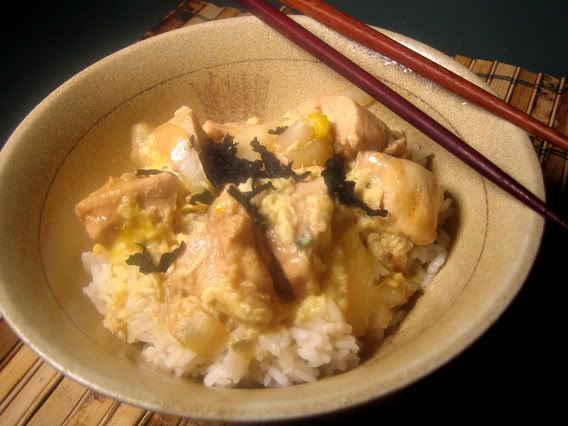See the soft, somewhat dream-like glow of the oyakodon? This is a natural result of its deliciousness translated through the power of digital technology. Or maybe the steam from the hot rice fogged up the lens a little.
You've all heard of the Chinese egg & chicken dish called "Mother & Child Reunion" (inspiration for the Paul Simon song of the same name--no lie). "Oyakodon" pretty much means the same thing, but its taste is distinctly Japanese, with a sauce made of mirin, soy, caster sugar, and dashi stock. So long as you have these basic ingredients (along with rice vinegar and sake) you can make a host of Japanese dishes, but this is one of my favorite and certainly one of the easiest. Serve over short-grain steamed rice, preceded by a simple salad topped with your own ginger dressing (see recipe below)
For those not in the know:
Mirin: a sweet, low-alcohol content rice wine
Caster sugar: finely granulated sugar. You can use regular refined sugar and put it in the food processor it for a minute or so (thanks to Nick for that tip)
Dashi stock: a stock comprising bonita flakes (skipjack tuna) and konbu (kelp). Homemade dashi is delicious, but can be expensive to make. You can buy insant dashi stock granules --dashi-no-moto -- in many Asian markets.
Recipe:
Oyakodon
serves 3-4
1 lb. boneless chicken breast or thigh meat, cut into 2-inch chunks
1 large or 2 medium onions, sliced
3 large eggs, whipped
Sauce:
1 1/2 cups dashi stock (if using dashi-no-moto, mix 1 Tbsp. in 1 1/2 cups of water)
2 Tbsp. soy sauce (preferably light soy sauce)
3 Tbsp. mirin
3 Tbsp. caster sugar
1 Tbsp. sake (optional)
1) heat large sauce pan (with lid) over medium high heat. Mix together sauce ingredients and pour into pan. Add onions and spread in an even layer. Let cook for 4-5 minutes until they start to soften.
2) Add chicken in a single layer over the onions, cover tightly and let cook for 5 minutes. Turn chicken over and cook for another 5 minutes.
3) When chicken is cooked through, pour the beaten eggs evenly over the top and allow to cook for about 1 minute. Remove from heat and allow the eggs to cook a little more. You don't want the eggs to harden too much, they should be cooked, but still be ever so slightly runny.
4) Serve over short-grain, steamed Japanese rice (ratio: 1 1/4 cup water per 1 cup rice)
Tasty Ginger Dressing
(serves 4)
1-inch piece of ginger, peeled and chopped roughly
1/2 medium-sized carrot, peeled and chopped roughly
1 clove garlic, peeled, chopped roughly
1 tsp. caster sugar
2 Tbsp. seasoned rice vinegar
1/4 tsp. sesame oil
3 Tbps. soybean (vegetable) oil
1 tsp. sake (optional)
blend all ingredients except vegetable oil in a small food processor (if you only have a large food processor, quadruple the measurements and have lots of leftover dressing) until smooth, then add the vegetable oil slowly while blending.


6 comments:
I hate to sound anal, but it's actually oyakodon, oya meaning mother and ko meaning child.
That being said, the recipe looks absolutely fabulous. I love Japanese food :)
~Nina
Not anal at all, its good to know these types of things since, despite my enormous love of sushi and Japanese food, I don't actually speak very much Japanese. I think maybe the wires crossed in my brain, and I was somehow associating it with "katsudon," which, admittedly, isn't all that similar. Anyhow, thanks for the tip!
Wow, thanks so much for this recipe. I've made it twice now (although I don't have bonito and have substituted with shiitake stock and fish sauce), and it's absolutely delicious (plus easy!)
thanks for the recipe! really great
-cy@singapore
I hate to sound anal toward the person who hates to sound anal, but 親(oya) actually means "parent".
I'm going to try this recipe out now. It sounds so delicious.
OYA means Parent, Ko means Child, DON is short for DONBURI.
The Chicken meat (usually thigh) represents the Parent and the Eggs represent the Child since Eggs come from the Chickens. That's the reasoning behind the name. DONBURI is the bowl its served in.
Post a Comment